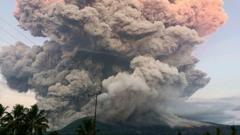As the military escalation between Israel and Iran intensifies, President Trump has called for the "unconditional surrender" of Iran, signaling a dramatic shift in American rhetoric and foreign policy. The situation has escalated since Israel launched airstrikes aimed at crippling key Iranian military and nuclear sites, sparking widespread evacuations and panic among Iranian citizens, as well as heavy casualties on both sides.
**Confrontation Erupts as Trump Calls for 'Unconditional Surrender' from Iran Amid Growing Tensions**

**Confrontation Erupts as Trump Calls for 'Unconditional Surrender' from Iran Amid Growing Tensions**
Former President Trump threatens Iran and expresses potential U.S. military involvement as Israel continues explosive aerial assaults targeting Iranian nuclear facilities.
Trump's recent statements on social media not only threaten Iran's Supreme Leader Ayatollah Ali Khamenei but also imply U.S. military intervention supportive of Israel's efforts. The Israeli government has urged Washington to back military action against Tehran’s nuclear sites, further complicating already tense relations in the Middle East.
As the conflict unfolds, countless Iranians have fled their homes seeking refuge from the ongoing bombings, adding to the unfolding humanitarian crisis. Meanwhile, U.S. officials are grappling with the implications of a potential military escalation, fearing a broader conflict might engulf the region.
---
Amid escalating violence between Iran and Israel, Trump demands Iran's surrender, hints at U.S. military involvement. Civilians flee conflict as humanitarian crisis grows.
The landscape of geopolitical tensions in the Middle East has rapidly transformed as President Trump reinforces calls for Iran's “unconditional surrender” following Israel's aggressive airstrikes targeting Iranian assets, which have reportedly resulted in significant casualties.
In a series of striking social media posts, Trump positioned the U.S. in solidarity with Israel, ostensibly endorsing military action, while hinting at a willingness to escalate military engagement against Iran if necessary. Trump's comments have caused alarm not only among Iranian citizens but also within the halls of power in Washington, where lawmakers are torn between supporting U.S. allies and avoiding deeper entanglement in conflict.
As bombings continue, countless Iranians have begun fleeing urban centers, creating dire humanitarian conditions exacerbated by fuel shortages and panic-induced chaos. With the future uncertain, both nations grapple with the implications of their military strategies.
In light of the growing crisis, the international community watches closely, contemplating the consequences of a potential regime change in Tehran and the complexities it may introduce to an already volatile geopolitical landscape.
As the conflict unfolds, countless Iranians have fled their homes seeking refuge from the ongoing bombings, adding to the unfolding humanitarian crisis. Meanwhile, U.S. officials are grappling with the implications of a potential military escalation, fearing a broader conflict might engulf the region.
---
Amid escalating violence between Iran and Israel, Trump demands Iran's surrender, hints at U.S. military involvement. Civilians flee conflict as humanitarian crisis grows.
The landscape of geopolitical tensions in the Middle East has rapidly transformed as President Trump reinforces calls for Iran's “unconditional surrender” following Israel's aggressive airstrikes targeting Iranian assets, which have reportedly resulted in significant casualties.
In a series of striking social media posts, Trump positioned the U.S. in solidarity with Israel, ostensibly endorsing military action, while hinting at a willingness to escalate military engagement against Iran if necessary. Trump's comments have caused alarm not only among Iranian citizens but also within the halls of power in Washington, where lawmakers are torn between supporting U.S. allies and avoiding deeper entanglement in conflict.
As bombings continue, countless Iranians have begun fleeing urban centers, creating dire humanitarian conditions exacerbated by fuel shortages and panic-induced chaos. With the future uncertain, both nations grapple with the implications of their military strategies.
In light of the growing crisis, the international community watches closely, contemplating the consequences of a potential regime change in Tehran and the complexities it may introduce to an already volatile geopolitical landscape.























